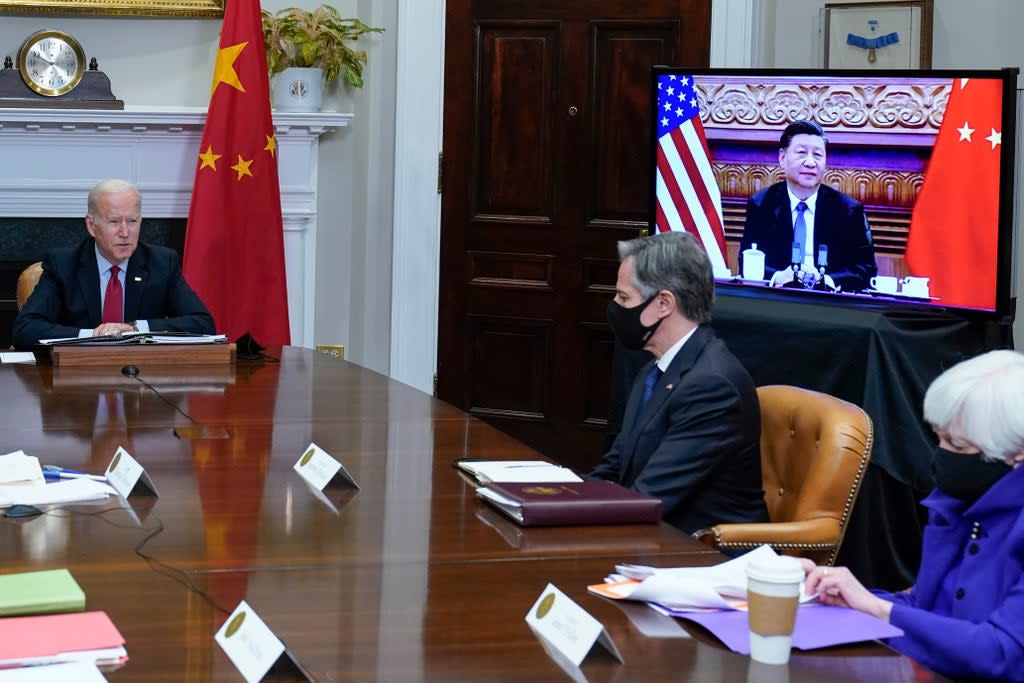Biden warns Xi against ‘unilateral effort’ to change Taiwan in virtual US-China summit

United States president Joe Biden and China’s Xi Jinping locked horns over Taiwan during their first virtual summit which concluded after three hours.
Mr Biden told his counterpart that the US is strongly opposed to "unilateral efforts to change the status quo” or undermine peace and stability across the Taiwan Strait.
He added that their responsibility as leaders is to ensure that competition between their respective nations “does not veer into conflict, whether intended or unintended”.
He said the relationship between the world’s two largest economies should be one of “simple, straightforward competition”, and suggested that he and Mr Xi needed to establish guidelines for that competition.
However, Mr Xi warned the American president that supporting Taiwan's bid for independence would be "like playing with fire" and Beijing is prepared to take “decisive measures”, according to Chinese state media. The Chinese president added that “those who play with fire will get burned”.
After the meeting, the White House said Mr Biden reiterated the US will abide by the longstanding US “One China” policy, which recognises formal relations with Beijing but allows defence ties with Taipei.
Beijing maintains that Taiwan is a part of its national territory, even though the island has been self-ruled since its split from the mainland after a civil war in 1949.
China has not ruled out the use of force to bring the sovereign state under its control and has been beefing its military activities around the island, including flying a record number of warplanes on Taiwan’s airspace.
Last month, Mr Biden said that the US would extend its forces to Taipei in the view of an attack from Beijing. Under a 1979 agreement, the US had pledged to make available support to Taiwan for its defence.
In a biennial military report, the defence ministry of Taiwan stated that Beijing has allegedly launched “grey zone” warfare — a tactic aimed at subduing a nation through exhaustion, stopping short of an actual war.
Prior to the summit on Monday evening, Taiwan was raised as a key point of contention in a call between Chinese foreign minister Wang Yi and US secretary of state Antony Blinken.
Apart from Taiwan, both the leaders also discussed other controversial issues like China's practices in Xinjiang and Hong Kong.
“It seems to me we need to establish some common-sense guardrails, to be clear and honest where we disagree, and work together where our interests intersect, especially on vital global issues like climate change,” Mr Biden said, calling the establishment of such constraints “responsible world leadership”.
“We have a responsibility to the world, as well as to our people. It’s why we believe … all countries have to play by the same rules of the road,” he continued, adding later that that belief was why the US would “always…stand up for our interests and values and those of our allies and partners”.
Mr Xi, through a translator, replied that the two countries “face multiple challenges together” and must “increase communication and cooperation,” both as the world’s two top economies and as permanent members of the UN Security Council.
“A sound and steady China-US relationship is required for advancing our two countries’ respective development and for safeguarding a peaceful and stable international environment, including finding effective responses to global challenges such as climate change … and the Covid pandemic,” Mr Xi said.
Monday’s virtual meeting was Mr Biden’s first face-to-face communication with Mr Xi since he took office in January, though the two leaders have held several phone calls. The meeting was conducted through secure videoconference because Mr Xi has not left Chinese soil in more than two years due to the Covid-19 pandemic.
Read More
UN nuclear watchdog chief presses for more access in Iran
Asian stocks mixed after late slump on Wall Street
Bidens open holidays with Christmas tree and 'friendsgiving'
Alex Jones, Roger Stone subpoenaed by House Jan. 6 committee
Fed's Powell will aim to win a high-stakes bet in 2nd term
Kyle Rittenhouse says Joe Biden defamed him by calling him white nationalist


